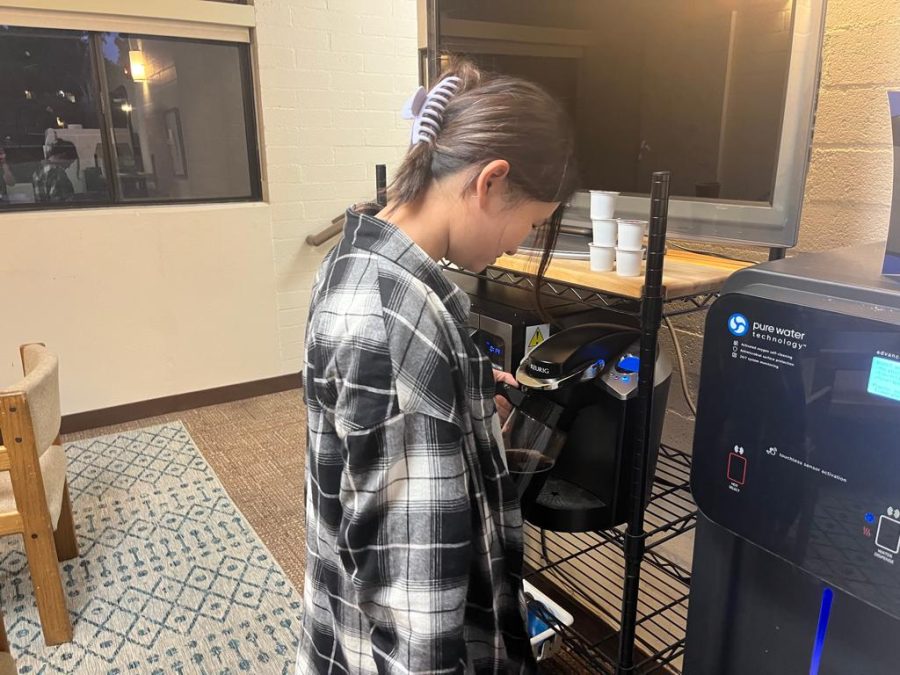As the clock ticks past 2 a.m., your heavy eyelids fight to stay open in front of the dimly lit desk. Somehow, you find yourself blankly staring at the unforgiving bright screen of another 5-page paper due the next day. Filled with regret and desperation, your lifeless fingers reach out for yet another energy drink, hoping for just a few more hours of precious time before the looming deadline. This is an all too familiar feeling for Webb students — and it needs to stop.
Caffeine is a drug that stimulates brain activity and the nervous system, increasing alertness. It is accessible through soda, coffee, energy drinks, and more, leading students to resort to caffeine use for easier concentration, or to aid in staying up late and the sleep deprivation that comes afterwards. However, there are two sides to every coin: Although caffeine can lead to enhanced productivity, overconsumption could potentially have worse health consequences in store.
“Caffeine use is not recommended for anyone under 18,” said Courtney Ornelas, Registered Nurse. “You just want to be aware of what you’re putting in your body and the effects it’s going to have. When you have too much [caffeine], your heart rate and blood pressure increases, [and you have] difficulty concentrating.”
The American Academy of Pediatrics suggests no more than 100mg of caffeine a day for teenagers 12-17 years-old, but preferably no caffeine usage at all. 100mg is equivalent to a cup of coffee, an eight-ounce can of Red Bull, or two cans of Coke, but most Starbucks coffee drinks and energy drinks that are popular amongst Webb students exceed this number. For example, a grande– sized latte contains 150mg of caffeine, and a five-hour energy shot contains 200mg of caffeine.
However, the temptation of caffeine is very real. Not only does it give us a spike of energy to power through fatigue, it is also highly accessible and convenient.
“I drink caffeine almost every day in the morning,” Saira Bhagat (‘25) said. “I go to Starbucks [before school], and I get 11 pumps of Chai because I’m really tired and I need energy. My average sleep time is like 4 hours.”
An innocent cup of coffee to jumpstart our day could turn into caffeine reliance overtime, which eventually can lead us down a spiral into withdrawal. As I interviewed multiple members of the Webb community, I noticed that caffeine use is a problem not only within the Webb student population, but also with the faculty members as well.
“I do go through caffeine withdrawal,” said Meagan MacPhee, Humanities Department faculty. “I get headaches and I’m generally very groggy. As someone who deals with anxiety, I’ve been told that consuming a lot of caffeine is not helpful, but that hasn’t stopped me from continuing this habit. I think I would like to get to only two cups of coffee a day and the third cup is pushing it, but I will always have some sort of caffeine.”
Caffeine reliance is not completely our fault. Difficult classes, afternoon activities, and social commitments are hard to balance in the 24 short hours of a day. Given our limited time and overwhelming workload, stress is a very common feeling for Webb students, and it is no surprise that many end up turning to caffeine to cope.
“Give me less homework please,” said Alfonso Alvarez-Seara (‘23), a senior who drinks energy drinks for academic and athletic purposes. “What are we doing? I’m drowning over here.”
We also see similar troubles from a faculty’s perspective.
“Student and teacher reliance on caffeine shows that we are a community that has a lot of obligations, a lot of involvements and things we’re interested in, and sometimes we stretch ourselves a little too thin, sacrificing sleep as a result,” Ms. MacPhee said. “I think that there are structural changes that we could make — how we assign homework and the load, as well as how we talk about the balance between academics, health, and personal needs.”
As limited sleep and excessive caffeine consumption continue to become the punch line for jokes, the physical and mental consequences of caffeine reliance are often overlooked.
“You get into this endless cycle, and we don’t want you guys even starting that,” Nurse Courtney said. “You can go through withdrawals, and breaking the habits can be very difficult. Increased heart rate goes to Tachycardia, it can lead to irregular rhythm. High Blood pressure leads to a lot of other health risks.”
Learning how to balance our responsibilities and commitments is a life skill that is way more valuable than a cup of coffee could ever be. The next time you are having a tiring morning, or plan to stay up late to study and end up reaching out for some caffeine, I urge you to reconsider. Is it healthy? Is it needed? Are you starting to rely on it? Studying at Webb is demanding, but it is important that we prioritize our mental and physical health.







![Many Webb students spend their free time in the library watching a popular TV show like Riverdale and Euphoria. “Based off what I’ve seen, like in Euphoria, because the actors are older, they don't showcase an actual high school life properly,” Sochika Ndibe (‘26) said. “Since [the actors] are older [and] playing a teenager, from a girl’s perspective, it is going to make you think you should look more developed at a young age.” The actor, who plays Veronica Lodge, was 22 years old at the time of filming.](https://webbcanyonchronicle.com/wp-content/uploads/2025/03/Antecol-Media-affects-how-society-functions-graphic-1200x900.png)

